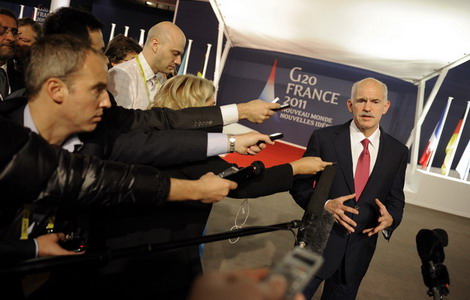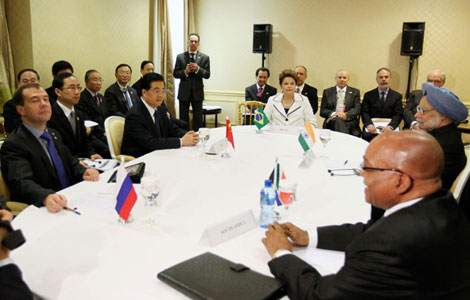Fed lowers GDP forecast, holds policy steady
Updated: 2011-11-03 10:20
(Agencies)
|
|||||||||||
Charles Evans, president of the Chicago Federal Reserve Bank, dissented on Wednesday because he wanted the central bank to ease policy at this meeting. Three officials who had voted against an easing in September supported the consensus.
Leading up to the meeting, Fed officials had been debating the possibility of further purchases of mortgage-backed securities and a potential overhaul of the Fed's communications policies. Evans has suggested the Fed keep interest rates near zero until the unemployment rate reaches 7 percent, unless inflation threatens to rise above 3 percent.
Bernanke made clear the central bank is keeping its options open, and said a discussion of a new communications framework did not mean the Fed would depart from its focus on employment and inflation. Some economists have urged the Fed to consider targeting nominal GDP.
US stocks held earlier gains after the statement was released, while prices of 10-year Treasury notes slipped.
"All eyes are quickly going to jump across the Atlantic to the south of France and the G20 comments on what is happening in Europe," said Karl Mills, president of Jurika, Mills & Keifer Investment Partners in Oakland, California, referring to a summit of leaders from the Group of 20 nations this week that will focus on taming Europe's debt crisis.
The US central bank's debate over the course of policy, including the idea of setting specific levels of unemployment and inflation as policy triggers, comes against a troubled global backdrop and with the US economy far from full health.
Greece's call for a referendum on the latest euro zone debt deal dashed hopes Europe had finally come to grips with its debt crisis, sending global equity markets into a tailspin.
The US recovery remains anemic and could be knocked off course if Europe fails to quell its crisis, a concern the Fed alluded to.
The economy grew at a 2.5 percent annual pace in the third quarter, a significant improvement over the second quarter's 1.3 percent increase but still too soft to put a dent in the nation's unemployment rate.
Faced with a still-weak recovery, the Fed in September embarked on a program to sell $400 billion in short-term Treasuries and invest the money in longer-dated bonds, an effort to keep long-term rates down.
It also dipped back into the mortgage market by reinvesting proceeds of its real estate bond holdings back into MBS.
Those actions followed an already aggressive series of steps to try to lift the economy. The central bank slashed benchmark interest rates effectively to zero in December 2008 and expanded its balance sheet to a record $2.8 trillion.
- Hu urges efforts to promote financial stability
- More grassroots delegates for CPC
- Concerns over social security scheme
- China urges support for Afghanistan
- Greek PM under pressure to quit
- China to build manned space station around 2020
- Hu attends G20 summit in Cannes
- China's imports, exports exceed $3t
Hot Topics
Libya conflict, Gaddafi, Oil spill, Palace Museum scandal, Inflation, Japan's new PM, Trapped miners, Mooncake tax, Weekly photos, Hurricane Irene
Editor's Picks

|

|

|

|

|

|







